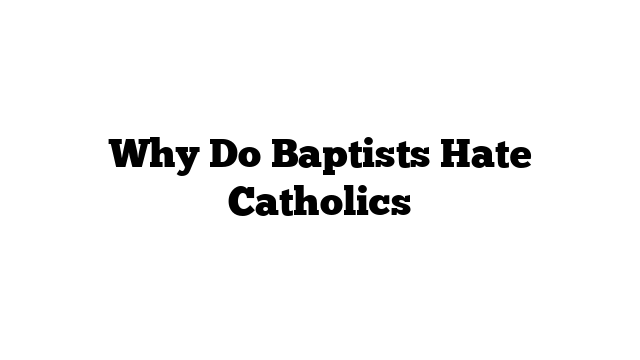Inter-faith & Inter-denomination
Why Do Baptists Hate Catholics
Title: Understanding the Misunderstandings: Exploring the Baptist-Catholic Divide
Introduction
In the world of Christianity, different denominations often have differing beliefs and practices. One such division exists between Baptists and Catholics. While it may be an exaggeration to say that Baptists hate Catholics, there are certainly theological and cultural differences that have historically caused tension between the two groups. This article aims to explore these differences, shed light on the misconceptions, and foster understanding and respect between Baptists and Catholics.
The Foundation of Beliefs
1. Salvation and Justification: One fundamental difference lies in their understanding of salvation and justification. For Baptists, salvation is achieved through faith alone, emphasizing an individual’s personal relationship with Jesus Christ. On the other hand, Catholics believe in the cooperation of faith and works, seeing salvation as a lifelong process that involves sacraments and good deeds.
2. Church Structure: Baptists are known for their congregational style of church governance, where each local church is autonomous and self-governing. In contrast, Catholics have a hierarchical structure with the Pope at the helm, bishops overseeing dioceses, and priests leading individual parishes.
Sacraments and Rituals
1. Communion: Baptists generally view communion as a symbolic act, where the bread and wine represent the body and blood of Christ. They believe it serves as a memorial of Jesus’ sacrifice. Conversely, Catholics believe in transubstantiation, the belief that the bread and wine are transformed into the actual body and blood of Christ during the Eucharistic celebration.
2. Role of Mary and the Saints: Another point of contention is the veneration of Mary and the saints in Catholicism. While Catholics see them as intercessors who can pray for the faithful, Baptists may view this practice as idolatry, detracting from the direct relationship between the individual and Jesus.
3. Baptism: Baptists practice believer’s baptism, where the sacrament is performed on those old enough to profess their faith. Meanwhile, Catholics practice infant baptism, seeing it as a means of cleansing original sin and welcoming the child into the Christian community.
Historical Context
Historical events have also influenced the relationship between Baptists and Catholics throughout the years.
1. Protestant Reformation: Baptists trace their roots back to the Protestant Reformation, a movement that sought to reform the Catholic Church. The tensions born from this historical period can still be felt today.
2. Anti-Catholic Sentiment: In some regions and times, Catholics have faced discrimination and prejudice. This sentiment has led to misunderstandings and misconceptions between the two groups.
Fostering Understanding and Respect
1. Dialogue: Open and respectful dialogue between Baptist and Catholic theologians and leaders is crucial in bridging the divide and dispelling misunderstandings. Interfaith discussions can help foster a deeper understanding of each other’s perspectives and create opportunities for collaboration on shared values.
2. Education: Educational initiatives aimed at providing accurate information about each denomination’s beliefs and practices can go a long way in dispelling stereotypes and promoting empathy and respect.
3. Interfaith Activities: Joint community service projects, Bible studies, and prayer meetings can help Baptists and Catholics find common ground and work together for the betterment of society.
Conclusion
While it may be true that there have been historically based tensions between Baptists and Catholics, it is important to approach these differences with empathy and understanding. By engaging in dialogue, education, and interfaith activities, Baptists and Catholics can find common ground and build bridges of respect and cooperation. Ultimately, both groups share a belief in Jesus Christ and the importance of living out their faith in accordance with their respective traditions.

